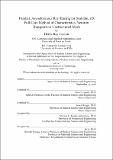Parallel, asynchronous ray-tracing for scalable, 3D, full-core method of characteristics neutron transport on unstructured mesh
Author(s)
Gaston, Derek Ray.
Download1237641683-MIT.pdf (29.96Mb)
Other Contributors
Massachusetts Institute of Technology. Department of Nuclear Science and Engineering.
Advisor
Kord S. Smith and Benoit Forget.
Terms of use
Metadata
Show full item recordAbstract
One important goal in nuclear reactor core simulations is the computation of detailed 3D power distributions that will enable higher confidence in licensing of next-generation reactors and lifetime extensions/power up-rates for current-generation reactors. To date, there have been only a few demonstrations of such high-fidelity deterministic neutron transport calculations. However, as computational power continues to grow, such capabilities continue to move closer to being practically realized. Predictive reactor physics needs both neutronics calculations and full-core, 3D coupled multiphysics simulations (e.g., neutronics, fuel performance, fluid mechanics, structural mechanics). Therefore, new reactor physics tools should harness supercomputers to enable full-core reactor simulations and be capable of coupling for multiphysics feedback. One candidate for full-core nuclear reactor neutronics is the method of characteristics (MOC). Recent advancements have seen a pellet-resolved 3D MOC solution for the BEAVRS benchmark. However, MOC is traditionally implemented using constructive solid geometry (CSG) that makes it difficult (if not impossible) to accurately deform material to capture physical feedback effects such as fuel pin thermal expansions, assembly bowings, or core flowering. An alternative to CSG is to use unstructured, finite-element mesh for spatial discretization of MOC. Such mesh-based geometries permit directly linking to unstructured mesh-based multiphysics tools, such as fuels performance. Utilizing unstructured mesh has been attempted in the past, but those attempts have fallen short of producing usable 3D reactor simulators. Several key issues have hindered these attempts: lack of fuel volume preservation, approximations of boundary conditions, inefficient spatial domain decompositions, excessive memory requirements, ineffective parallel load balancing, and lack of scalability on massively parallel modern computer clusters. This thesis resolves these issues by developing a massively parallel, 3D, full-core MOC code, called MOCkingbird, using unstructured meshes. Underpinning MOCkingbird is a new algorithm for parallel ray tracing: the Scalable Massively Asynchronous Ray Tracing (SMART) algorithm. This algorithm enables efficient parallel ray-tracing across the full reactor domain, alleviating issues of reduced convergence associated with standard parallel MOC algorithms. In addition, to enable full-core simulation using unstructured mesh MOC, several new algorithms are developed, including reactor mesh generation, sparse parallel communication, parallel cyclic track generation, and weighted partitioning. Within this work MOCkingbird and SMART are tested for scalability from 10 to 20,000 cores on the Lemhi supercomputer at Idaho National Laboratory. Accuracy is tested using a suite of benchmarks that ultimately culminate in a first-of-a-kind, 3D, full-core, simulation of the BEAVRS benchmark using unstructured mesh MOC.
Description
Thesis: Ph. D., Massachusetts Institute of Technology, Department of Nuclear Science and Engineering, February, 2020 Cataloged from student-submitted PDF version of thesis. Includes bibliographical references (pages 213-224).
Date issued
2020Department
Massachusetts Institute of Technology. Department of Nuclear Science and EngineeringPublisher
Massachusetts Institute of Technology
Keywords
Nuclear Science and Engineering.